Unit 8 Have you read Treasure Island yet?现在完成时及瞬间变延续专项讲解课件57张
文档属性
| 名称 | Unit 8 Have you read Treasure Island yet?现在完成时及瞬间变延续专项讲解课件57张 | 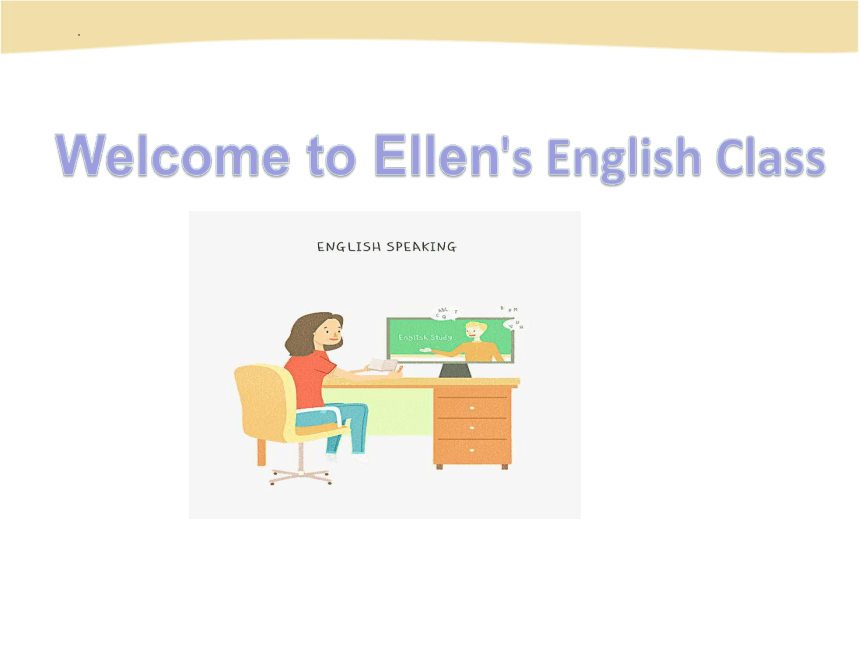 | |
| 格式 | pptx | ||
| 文件大小 | 419.5KB | ||
| 资源类型 | 教案 | ||
| 版本资源 | 人教新目标(Go for it)版 | ||
| 科目 | 英语 | ||
| 更新时间 | 2022-04-09 10:48:18 | ||
图片预览

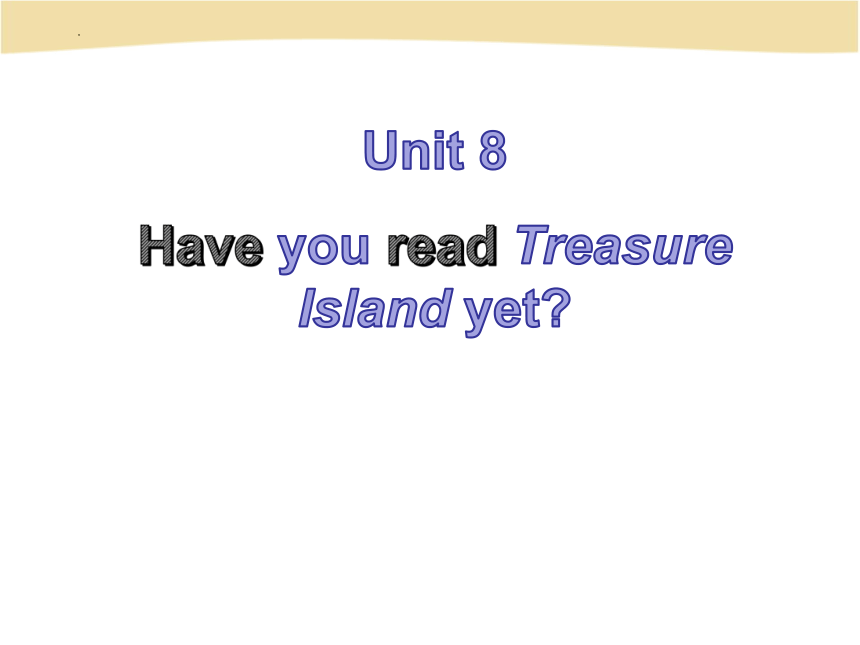
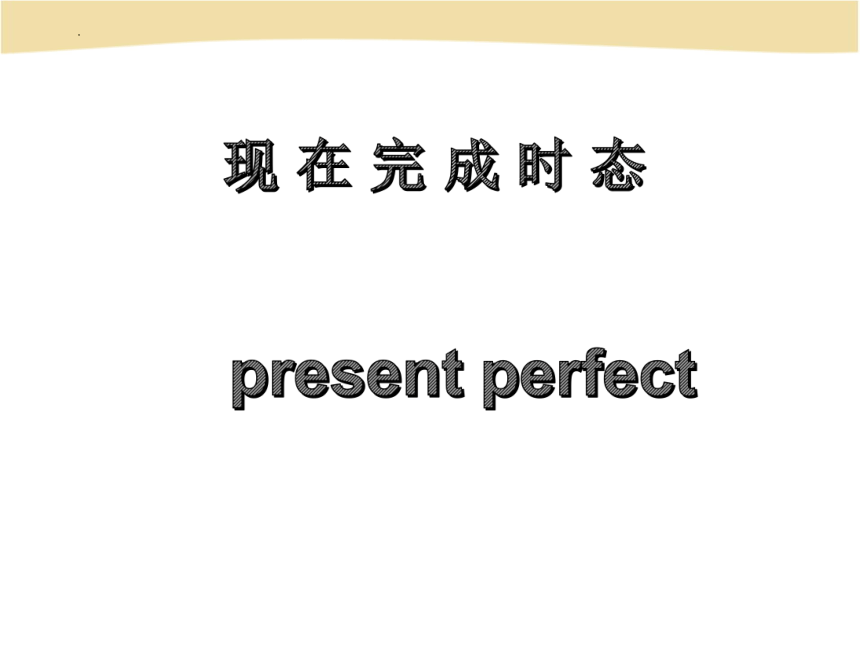
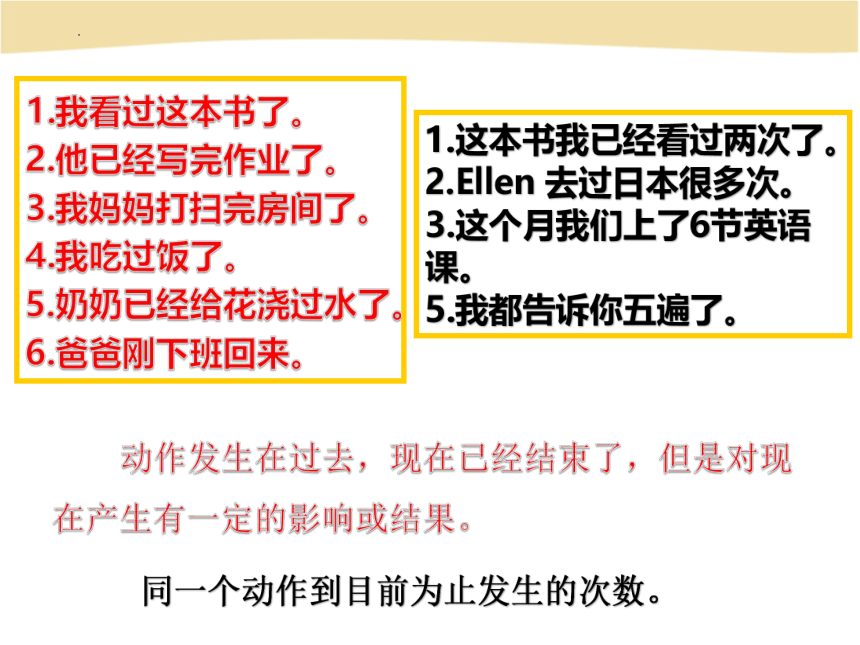
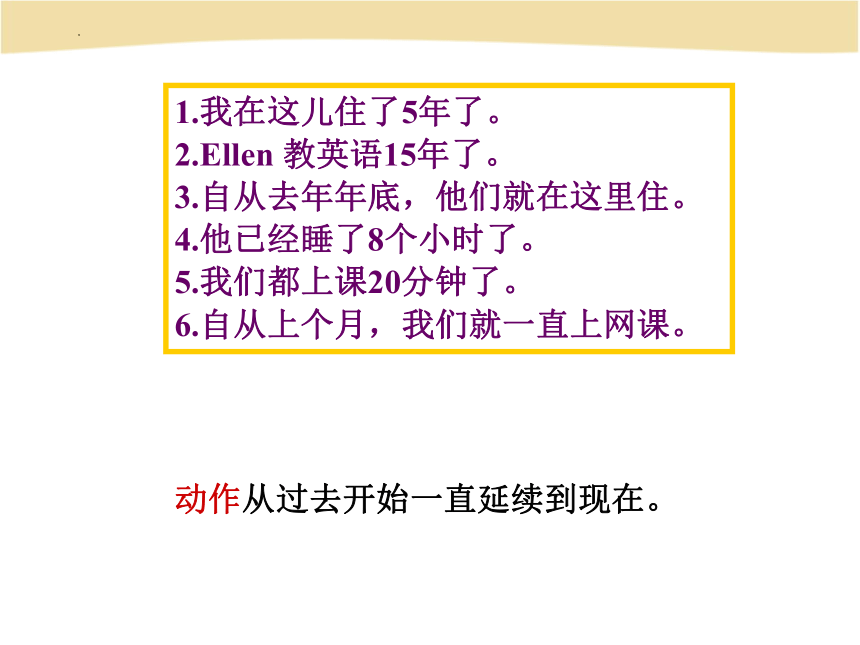
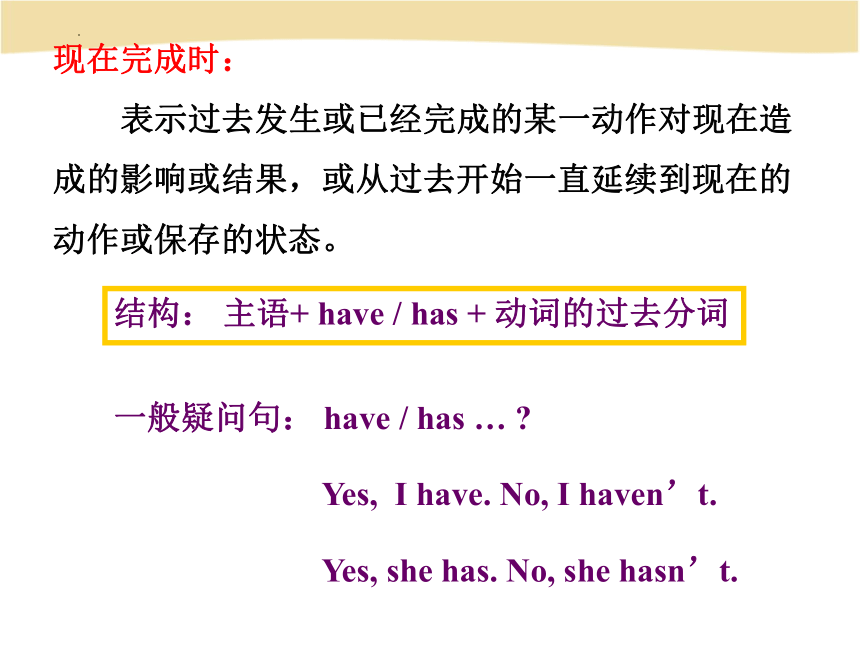
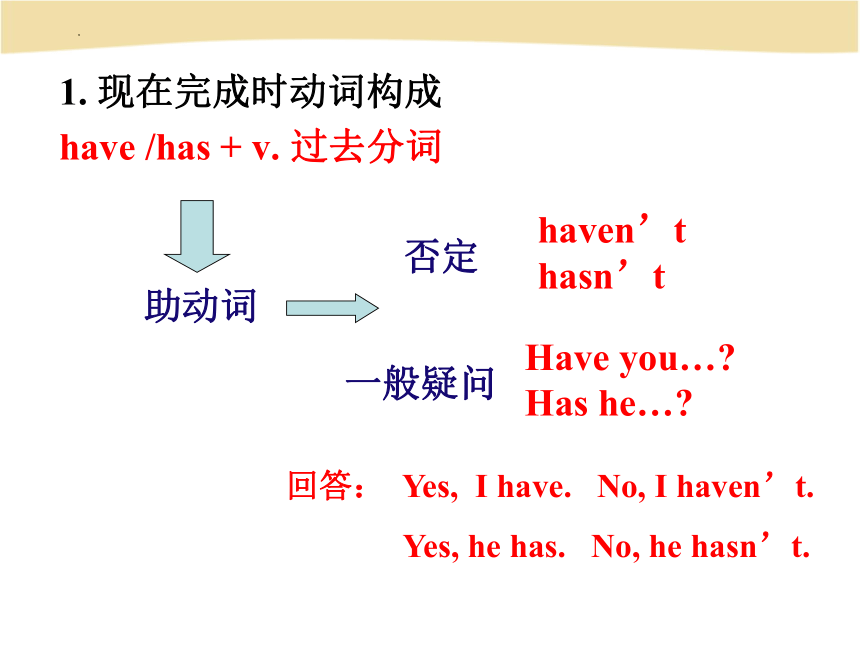
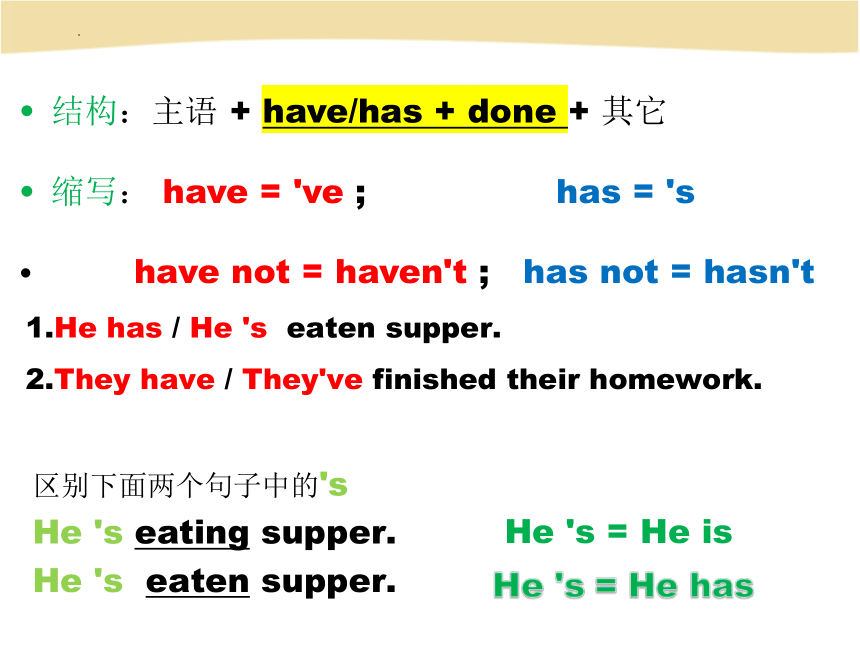
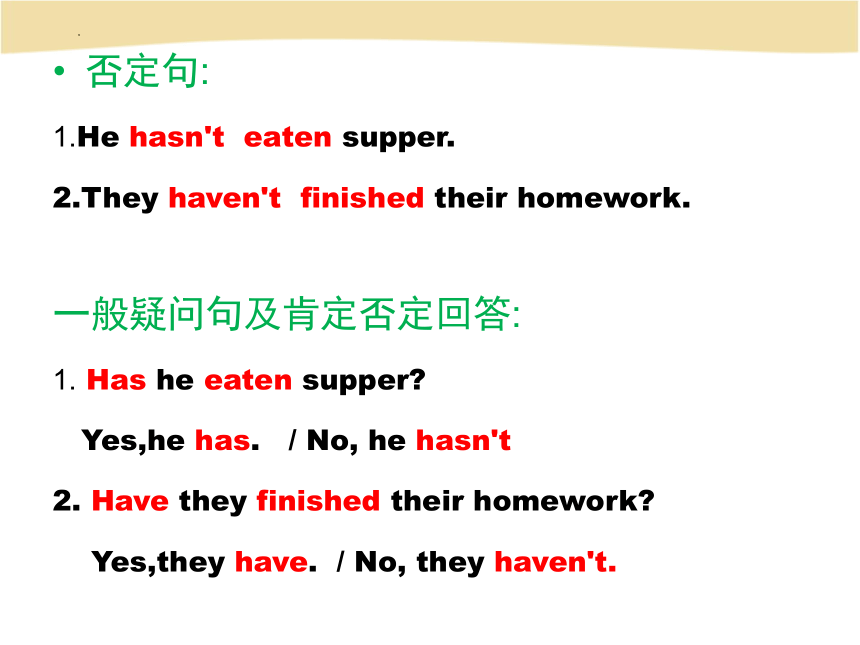
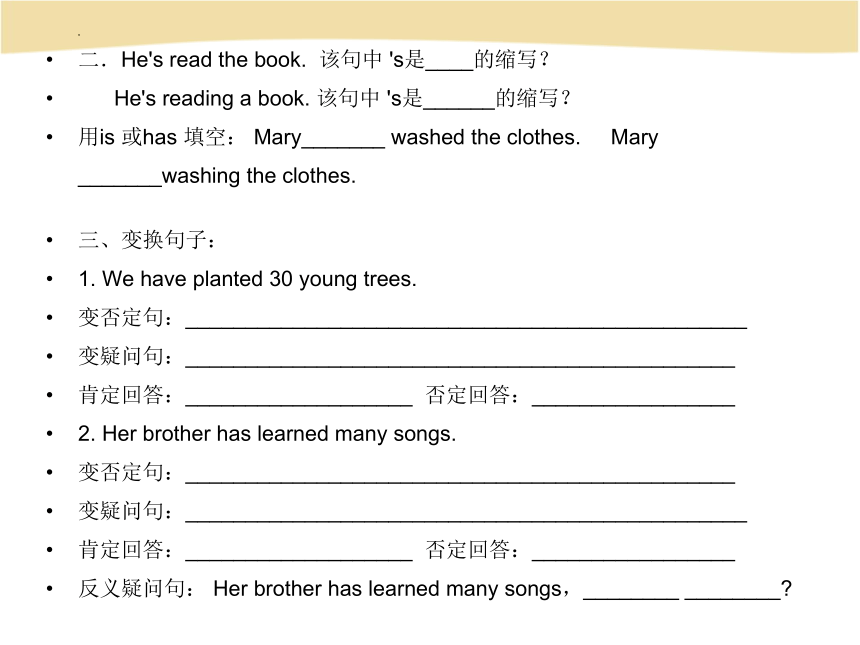
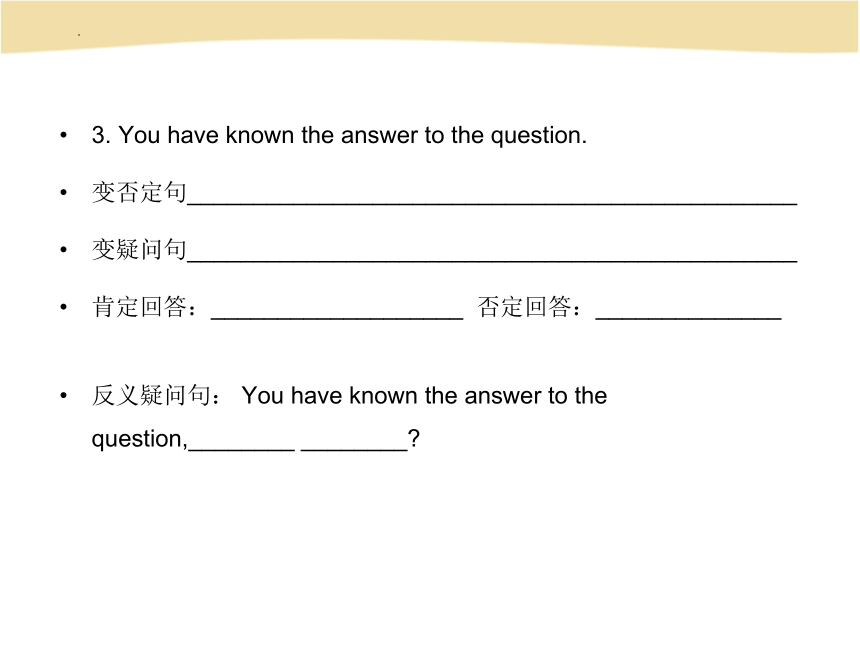
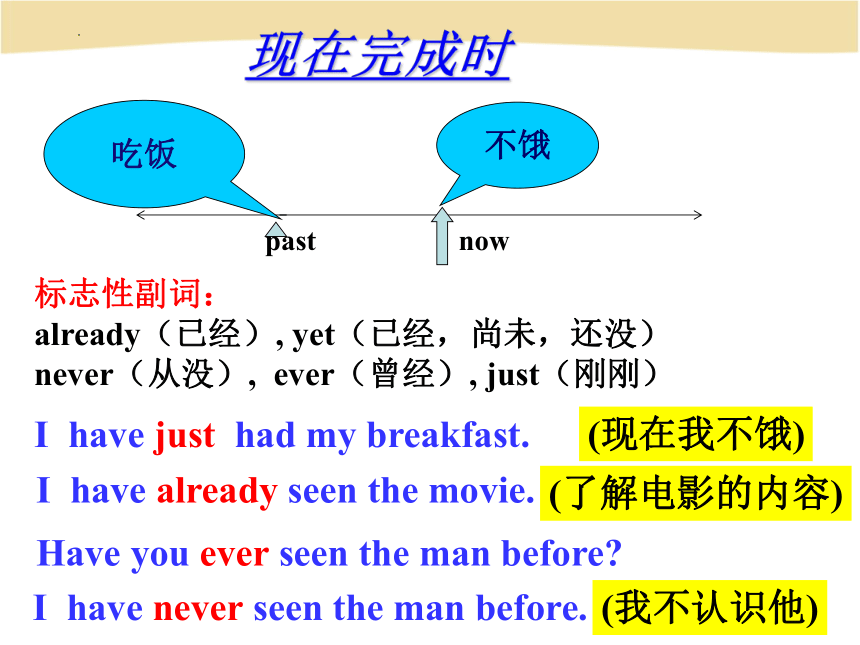
文档简介
(共57张PPT)
Welcome to Ellen's English Class
Unit 8
Have you read Treasure Island yet
present perfect
现 在 完 成 时 态
同一个动作到目前为止发生的次数。
1.我看过这本书了。
2.他已经写完作业了。
3.我妈妈打扫完房间了。
4.我吃过饭了。
5.奶奶已经给花浇过水了。
6.爸爸刚下班回来。
1.这本书我已经看过两次了。
2.Ellen 去过日本很多次。
3.这个月我们上了6节英语课。
5.我都告诉你五遍了。
动作发生在过去,现在已经结束了,但是对现在产生有一定的影响或结果。
1.我在这儿住了5年了。
2.Ellen 教英语15年了。
3.自从去年年底,他们就在这里住。
4.他已经睡了8个小时了。
5.我们都上课20分钟了。
6.自从上个月,我们就一直上网课。
动作从过去开始一直延续到现在。
现在完成时:
表示过去发生或已经完成的某一动作对现在造成的影响或结果,或从过去开始一直延续到现在的动作或保存的状态。
结构: 主语+ have / has + 动词的过去分词
一般疑问句: have / has …
Yes, I have. No, I haven’t.
Yes, she has. No, she hasn’t.
1. 现在完成时动词构成
have /has + v. 过去分词
助动词
否定
haven’t
hasn’t
一般疑问
Have you…
Has he…
回答: Yes, I have. No, I haven’t.
Yes, he has. No, he hasn’t.
区别下面两个句子中的's
He 's eating supper.
He 's eaten supper.
结构:主语 + have/has + done + 其它
缩写: have = 've ; has = 's
have not = haven't ; has not = hasn't
1.He has / He 's eaten supper.
2.They have / They've finished their homework.
He 's = He is
He 's = He has
否定句:
1.He hasn't eaten supper.
2.They haven't finished their homework.
一般疑问句及肯定否定回答:
1. Has he eaten supper
Yes,he has. / No, he hasn't
2. Have they finished their homework
Yes,they have. / No, they haven't.
二.He's read the book. 该句中 's是____的缩写?
He's reading a book. 该句中 's是______的缩写?
用is 或has 填空: Mary_______ washed the clothes. Mary _______washing the clothes.
三、变换句子:
1. We have planted 30 young trees.
变否定句:_______________________________________________
变疑问句:______________________________________________
肯定回答:___________________ 否定回答:_________________
2. Her brother has learned many songs.
变否定句:______________________________________________
变疑问句:_______________________________________________
肯定回答:___________________ 否定回答:_________________
反义疑问句: Her brother has learned many songs,________ ________
3. You have known the answer to the question.
变否定句______________________________________________
变疑问句______________________________________________
肯定回答:___________________ 否定回答:______________
反义疑问句: You have known the answer to the question,________ ________
现在完成时
标志性副词:
already(已经), yet(已经,尚未,还没)
never(从没), ever(曾经), just(刚刚)
吃饭
I have just had my breakfast.
(现在我不饿)
不饿
now
past
I have already seen the movie.
(了解电影的内容)
I have never seen the man before.
(我不认识他)
Have you ever seen the man before
already和yet都可以作为现在完成时的标
志词,你能发现他们用法的不同吗?
发现规律:
1.We have already cleaned up our classroom.
2. I have already read Treasure Island.
3. Have you read the book yet
4. The bus hasn’t come yet.
◆already一般用于肯定句中,译为:已经
◆yet一般用于疑问句(已经)和否定句中(还没)
Practice: already or yet
1. I have _________ finished reading it.
2. Have you decided which book to write about _________
3. I haven't seen the film ________.
already
yet
yet
e.g. 1.Have you _____been to Japan
2.He has _____ finished his homework.
3.We have _____cleaned our room.
4.I haven’t had breakfast ____.
5.She has _______bought the dictionary
ever
just
already
yet
用.just, already, yet, ever, never填空
never
有此类副词时,常强调动作完成,不强调动作的持续.
3. 现在完成时与一般过去时的区别:
A. I have cleaned my room. (强调房间现在是干净的)
I cleaned my room last week. (不强调房间现在是否干净)
B. They have bought a dictionary. (强调他们现在有字典)
They bought a dictionary a week ago.
(不强调他们现在有字典)
小结:现在完成时把过去的动作和现在的结果联系起来,一般过去时只限于表示过去的动作本身, 与现在的结果无关
1. I ________ (join) the book club last month
and I __________ (read) five books
already.
2. I only _________ (start) taking French
classes last week and I _____already_______ (learn) 50 French words .
practice:
joined
have read
started
have
learned
3. Tony ______ (buy) a pop music CD yesterday
but he _____________ (listen) to it yet.
4. They ___________ (listen) to many songs by
The Beatles, but they cannot sing any of them.
5. She _________ (see) the newspaper on the
table this morning, but she ______________
(have) any time to read it yet.
bought
hasn’t listened
have listened
saw
hasn’t had
注意: 现在完成时不能和明确指出时间的状语连用
(如: yesterday, last year, in 1976, two days
ago, just now, when she came in 等)
I have already bought the book. 对
I have already bought the book yesterday. 错
I bought the book yesterday. 对
但可以和如下 不明确指出时间的状语
如: already, yet, ever, never, just,once, twice,
before(以前), recently/lately(最近),
so far/up to now(迄今为止),
in the past few years(在过去的几年里)
1.Have you seen the movie before
2.He has been very busy recently.
3.So far/up to now, he has written many famous
songs.
4.Great changes have taken place in China
in the past 30 years.
现在完成时
表示过去已经开始,持续到现在的动作或状态,
常与for或since引起的一段时间状语连用。
moved here
in 2019
I still live here
I have lived here for three years.
I have lived here since 2019/three years ago.
now
past
( 1).for+表示一段时间的短语
( 2).since+表示过去时间点的词语 (since 2019/ three years ago)
( 3).since+表示过去时间的时间状语从句
1.I have been a teacher ______ a year.
2.He has been at this school _______ 1992.
3. Ellen has taught English ____15 years ago.
4.We have learned 1,000 English words _______ we came to this school.
for
since
since
现在完成时句中常见的时间状语
表示从过去一直持续到现在, 不能是具体的过去时间。
since
用since和for填空1.______two years 2.____two years ago
3.___last month 4.______ 1995.
5_______yesterday 6._______ 4 o’clock
7._______ 4 hours 8._____an hour ago
9_____ lunch time 10____ she left here1. Jim has been in Ireland ______ Monday.
2. Jill has been in Ireland ______ three days.3. His aunt has lived in Australia ______15 days.
4. Mary is in her office. She has been there ______ 7 o'clock.
用since和for填空
5. India has been an independent country ______1974.
6. The bus is late. They've been waiting ______ 20 minutes.7. Nobody lives in those houses. They have been empty ______ many years.8. Mike has been ill ______a long time. He has been in hospital ______ October.9. He has lived in Nanjing ___ last year..
10. I’ve known him ______ we were children.12. Our teacher has studied Japanese ______ three years.
13. She has been away from the city ______ about ten years.14. It’s about ten years __________ she left the city.
我认识他们五年了。
I have known them for five years.
自从5年前他们就认识
They have known each other since 2017.
自从2017年以来他们就认识
I have known them since five years ago.
自从他们搬到长春以来,他们就认识了。
They have known each other since they move to
Changchun.
have been to sp 去过某地,人已回
have gone to sp 去了某地,人未回
have been in sp +时间段 在某地待了多久
1. I have been to Japan many times.
2. ---Where is Jack
---He has gone to the library.
3. Mary went to Beijing last month.
She has been in Beijing for a month.
当地点是here, there, home 等副词时,介词省略。
He has been in here for 3 hours. 错
He has been here for 3 hours. 对
用 have been to , have gone to,have been in 填空。
1. Where is Jack He __________ his country.
2.The Smiths ___________ Beijing for years.
3._____ you ever _______ America
-- Yes, I _____ there many times.4.I ___________ this school since three years ago. 5.Would you like to go to the zoo with me
---I'd love to, but I _________ there before.
has gone to
have been in
Have
been to
been
have been in
have been
瞬间动词和延续性动词动词可以分为两类:瞬间动词/非延续性动词/短暂性动词,指动作一发生就结束,不能持续下去。所以这种动词后面不能跟表示一段时间的时间状语。如:come, arrive, finish, stop, leave, go, get, die, marry, begin, get to, get up,buy, borrow等。
延续性动词表示一种延续性的动作。后面可以跟表示一段时间的时间状语。如:work, live, study , sleep, wait, watch, eat, play等。
1.for …
2.since …
3.how long...
不能与表示一段时间的状语连用。
X I have borrowed the book for 3 weeks.
X How long have you bought the bike How long不能用于提问瞬间动词。
X She has married Tom for two years.
X My father got up since 5 o'clock.
错
√ I have kept the book for 3 weeks.
√ How long have you had the bike
√ She has been married to Tom for two years.
√ My father has been up since 5 o'clock.
瞬间动词和延续性动词的转换buy→have borrow→keep put on→wear begin→be on leave→be away leave sp→be away from sp join→be in died→be dead arrive in/at, get to, reach, come to, go to, move to
→be in sp return to, come back, go back → be back
come/go out→ be out become→be
close→be closed open→be open
get up→be up marry→be marriedfinish/end→be over fall asleep/get to sleep→be asleep start/begin to do→ docatch a cold→have a clod lose→not have join the league/party/army→ be in the league/party/army
→be a member of the league/party/army
→be a league member/ a party member/a soldier
eg: I bought the bike 3 years ago.
→I have had the bike for 3 years/since 3 years ago .eg: The movie began 5 minutes ago.
→ The movie has been on for 5 minutes/since 5 minutes ago.eg: The old man died in 1999.
→ The old man has been dead since 1999.
eg: My brother joined the army 3 years ago.
→ My brother has been in the army for 3 years.
→ My brother has been a soldier for 3 years.eg: Tom arrived here 30 minutes ago.
→ Tom has been here for 30 minutes.eg: I started to teach here 3 years ago.
→ I have taught here for 3 years.
瞬间动词的否定式可以和段时间状语连用eg: I haven't bought clothes for 2 years.我两年没买衣服了。eg: I haven't left my room for 3 days. 我三天没出屋了。
练习:.短暂性转换延续性
1) His grandfather died two years ago . His grandfather has ________ ________ for two years. _____two years _____ his grandfather ____. Two years ______ _______ ________ his grandfather _____.
2) I became a teacher in 2000.I ________ __________ a teacher for _________ _________.
3) The shop closed two hours ago.The shop ________ _________ _________ for _________ _________.
4) The door opened at six in the morning.The door ________ ________ ________ for six hours.
been dead
It's
since
died
has passed since
died
have been
22 years
has been closed two hours
has been open
5.He left Fuzhou just now.He _______ ________ ________ _________ Fuzhou for five minutes.
6.The film began two minutes ago.The film ______ _______ ______ for _______ ________.
7.They borrowed it last week.They _________ _________ it since __________ __________.
8.I bought a pen two hours ago.I _________ _________ a pen for ________ __________.
has been away form
has been on two minutes
have kept last week
have had two hours
9.They married in 1990.They ________ _________ __________since _________.10.The meeting finished at six.The meeting ________ ______ ______ for six hours.
11.My brother joined the army two years ago.My brother ________ _______ a ________ for _______ _________.My brother _________ ________ in ________ ________ for two years.12.I put on my glasses three years ago.I __________ __________ my glasses for _________ _________.
have been married 1990
has been over
has been soldier two years
has been the army
have wore three years
现在完成时常用句型
1. It is/has been 时间段 since .....
或 一段时间 has passed since.....Eg: It is/ It's/ It has been 3 years since I left my hometown.= Three years has passed since I left my hometown.
It is 10 years since I came back to China。
练一练: 自从我回到中国已经10年。
自从我离开家乡已经三年了。
Ten years has passed since I came back to China。
自从我离开家乡三年已经过去了。
2. It is the first/second....time that + 现在完成的句子
Eg: It is the third time that I have met him.
这是我第三次遇见那个人。
练一练: 这是他第三次结婚。
It is the third time that he has got married.
3. 主语+ be动词+ the 形容词最高级+名词单数+that+现在完成时句子
eg: This is the most interesting movie that I have ever seen.
练一练:这是我听过的最好听的歌。
This is the best song that I have ever heard。
一个意思,五种表达1. I bought the bike 3 years ago. 2.→I have had the bike for 3 years .3.→I have had the bike since 3 years ago.4.→It's/ It is / It has been 3 years since I bought the bike. 5.→Three years has passed since I bought the bike.
一个意思,五种表达
1.Tom arrived here 30 minutes ago.
2.→
3.→
4.→
5.→
一个意思,五种表达1. I bought the bike 3 years ago. 2.→I have had the bike for 3 years .3.→I have had the bike since 3 years ago.4.→It's/ It is / It has been 3 years since I bought the bike. 5.→Three years has passed since I bought the bike.
Tom has been here for 30 minutes.
Tom has been here since 30 minutes ago.
It has been 30 minutes since Tom arrived here.
30 minutes has passed since Tom arrive here.
一个意思,五种表达
1.The movie began 5 minutes ago.
2.→
3.→
4.→
5.→
一个意思,五种表达1. I bought the bike 3 years ago. 2.→I have had the bike for 3 years .3.→I have had the bike since 3 years ago.4.→It's/ It is / It has been 3 years since I bought the bike. 5.→Three years has passed since I bought the bike.
The movie has been on for 30 minutes.
The movie has been on since 30 minutes ago.
It has been on 30 minutes since the movie began.
30 minutes has passed since the movie began.
一个意思,五种表达
1.I started to teach here 3 years ago.
2.→
3.→
4.→
5.→
一个意思,五种表达1. I bought the bike 3 years ago. 2.→I have had the bike for 3 years .3.→I have had the bike since 3 years ago.4.→It's/ It is / It has been 3 years since I bought the bike. 5.→Three years has passed since I bought the bike.
It has been 3 years since I started to teach here.
I have taught here since 3 years ago.
3 years has passed since I started to teach here.
I have taught here for 3 years.
一个意思,五种表达
1. The old man died in 2000.
2.→
3.→
4.→
5.→
一个意思,五种表达1. I bought the bike 3 years ago. 2.→I have had the bike for 3 years .3.→I have had the bike since 3 years ago.4.→It's/ It is / It has been 3 years since I bought the bike. 5.→Three years has passed since I bought the bike.
The man has been dead for 22 years..
The man has been dead since 22 years ago.
It has been 22 years since the man died.
22 years has passed since the man died.
一个意思,五种表达
1. The shop closed last year.
2.→
3.→
4.→
5.→
一个意思,五种表达1. I bought the bike 3 years ago. 2.→I have had the bike for 3 years .3.→I have had the bike since 3 years ago.4.→It's/ It is / It has been 3 years since I bought the bike. 5.→Three years has passed since I bought the bike.
The shop has been closed since a year ago.
The shop has been closed for a year.
It has been a year since the shop closed.
A year has passed since the shop closed.
1. A: Would you like something to drink
B: No, thanks. _______________________
(just/drink some tea)
2. A: I heard you lost your key.
__________________ (find)
B: No, not yet.
4a. Use the words in brackets to complete the conversations.
I’ve just drunk some tea
Have you found it
3. A: Do you know when Tom is leaving
B:___________________ . (already/leave)
A: When _________________ (leave)
B: He left this morning.
4. A: Is your sister going to the movies with us
tonight
B: No. _______________________________ .
(already/see the film)
5. A: What do your parents think about our
plan
B: I ____________________. (not/tell them/yet)
did he leave
She has already seen the film
have not told them yet
He has already left
Sally _______ (love) reading. In the morning, she reads the newspaper and in the evening she reads books. She _____ already ______ (read) more than 100 different books! Her favorite kind of books is science fiction. She is interested in science and technology and loves to imagine
4b. Fill in the blanks with the correct forms of the words in brackets.
loves
has read
what the world _______ (be) like in 50 years.
She __________ (finish) reading a book about robots last week and _____________ (write) a book report about it next week for her French class. Every time she is in the library, Sally looks at the many books she_____________ (not read) yet and she can’t wait to read them!
will be
finished
will write
has not read
改写句子
1.My father came back from the bookshop just now.
My father ______ just ________ ______ the book shop.
2.He began to learn Chinese in 2001.
He _____ _______ Chinese since 2001.
3.The film began two minutes ago.
The film _____ ______ ______ since two minutes ago.
4.He has had the motorbike for two years.
It’s two years ______he ________ the motorbike.
He ________ the motorbike two years ______.
Two years ______ ______ since he ______ the motor
bike.
has
returned
from
has
learned
has been on
since
bought
bought
ago
has passed
bought
你曾经吃过鱼和薯条吗?
2. 我刚刚丢了我的化学书。
3. 他已经吃过午饭
4.他们已去了美国五年了。
一、翻译下列句子:
Have you ever had / eaten fish and chips
I have just lost my chemistry book.
He has already had lunch.
They have been in the USA for five years.
5. 你已经看过这部电影了吗?
6. 我哥哥还没回来。
7.这本字典我已买了三年了。
8.我认识他们五年了。
Have you seen the movie yet
My brother hasn’t come /get / been back yet.
I have had this dictionary for three years.
I have known them for five years.
9.自从他搬到济宁,他就住这儿了。
10.我妹妹成为一个大学生已经三年。
11.自从1999年以来他们就认识。
12.我来到这个学校已3年多了。
I have been in this school for over three years.
He has been here since he moved to Jining.
My sister has been a college student for three years.
They have known each other since 1999.
1. She’s _____ (live) here ever since she was ten.
2. Both of them ___________ (be) in Hong Kong
for ten days.
3. Both of them ________ (come) to Hong Kong
ten days ago.
4. Mary________ (lose) her pen. ________ you
_______(see) it here and there
二、用适当的时态填空:
lived
have been
came
has lost
Have
seen
6. _________ you _____ (find) your watch yet
7. ---Are you thirsty
---No I ______ just _____(have) some orange.
8. We _____already ________(return) the book.
9. ________ they _______ (build) a new school
in the village
10. I __________________ (not finish) my
homework . Can you help me
11. My father _________(read) the novel twice.
Have
found
have
had
have
returned
Have
built
haven’t finished
has read
1) I have been there for two days.
_____ _______ ______ you _____ ________
2) My father has lived here since 2000.
____ ____ ____ your father _____ __________
3) He left here yesterday.
______ _____ he _________ __________
4) They bought a book two hours ago.
________ ________ they ________ a book
三、划线提问
How long have been there
How long has lived there
When did leave there
When did buy
Welcome to Ellen's English Class
Unit 8
Have you read Treasure Island yet
present perfect
现 在 完 成 时 态
同一个动作到目前为止发生的次数。
1.我看过这本书了。
2.他已经写完作业了。
3.我妈妈打扫完房间了。
4.我吃过饭了。
5.奶奶已经给花浇过水了。
6.爸爸刚下班回来。
1.这本书我已经看过两次了。
2.Ellen 去过日本很多次。
3.这个月我们上了6节英语课。
5.我都告诉你五遍了。
动作发生在过去,现在已经结束了,但是对现在产生有一定的影响或结果。
1.我在这儿住了5年了。
2.Ellen 教英语15年了。
3.自从去年年底,他们就在这里住。
4.他已经睡了8个小时了。
5.我们都上课20分钟了。
6.自从上个月,我们就一直上网课。
动作从过去开始一直延续到现在。
现在完成时:
表示过去发生或已经完成的某一动作对现在造成的影响或结果,或从过去开始一直延续到现在的动作或保存的状态。
结构: 主语+ have / has + 动词的过去分词
一般疑问句: have / has …
Yes, I have. No, I haven’t.
Yes, she has. No, she hasn’t.
1. 现在完成时动词构成
have /has + v. 过去分词
助动词
否定
haven’t
hasn’t
一般疑问
Have you…
Has he…
回答: Yes, I have. No, I haven’t.
Yes, he has. No, he hasn’t.
区别下面两个句子中的's
He 's eating supper.
He 's eaten supper.
结构:主语 + have/has + done + 其它
缩写: have = 've ; has = 's
have not = haven't ; has not = hasn't
1.He has / He 's eaten supper.
2.They have / They've finished their homework.
He 's = He is
He 's = He has
否定句:
1.He hasn't eaten supper.
2.They haven't finished their homework.
一般疑问句及肯定否定回答:
1. Has he eaten supper
Yes,he has. / No, he hasn't
2. Have they finished their homework
Yes,they have. / No, they haven't.
二.He's read the book. 该句中 's是____的缩写?
He's reading a book. 该句中 's是______的缩写?
用is 或has 填空: Mary_______ washed the clothes. Mary _______washing the clothes.
三、变换句子:
1. We have planted 30 young trees.
变否定句:_______________________________________________
变疑问句:______________________________________________
肯定回答:___________________ 否定回答:_________________
2. Her brother has learned many songs.
变否定句:______________________________________________
变疑问句:_______________________________________________
肯定回答:___________________ 否定回答:_________________
反义疑问句: Her brother has learned many songs,________ ________
3. You have known the answer to the question.
变否定句______________________________________________
变疑问句______________________________________________
肯定回答:___________________ 否定回答:______________
反义疑问句: You have known the answer to the question,________ ________
现在完成时
标志性副词:
already(已经), yet(已经,尚未,还没)
never(从没), ever(曾经), just(刚刚)
吃饭
I have just had my breakfast.
(现在我不饿)
不饿
now
past
I have already seen the movie.
(了解电影的内容)
I have never seen the man before.
(我不认识他)
Have you ever seen the man before
already和yet都可以作为现在完成时的标
志词,你能发现他们用法的不同吗?
发现规律:
1.We have already cleaned up our classroom.
2. I have already read Treasure Island.
3. Have you read the book yet
4. The bus hasn’t come yet.
◆already一般用于肯定句中,译为:已经
◆yet一般用于疑问句(已经)和否定句中(还没)
Practice: already or yet
1. I have _________ finished reading it.
2. Have you decided which book to write about _________
3. I haven't seen the film ________.
already
yet
yet
e.g. 1.Have you _____been to Japan
2.He has _____ finished his homework.
3.We have _____cleaned our room.
4.I haven’t had breakfast ____.
5.She has _______bought the dictionary
ever
just
already
yet
用.just, already, yet, ever, never填空
never
有此类副词时,常强调动作完成,不强调动作的持续.
3. 现在完成时与一般过去时的区别:
A. I have cleaned my room. (强调房间现在是干净的)
I cleaned my room last week. (不强调房间现在是否干净)
B. They have bought a dictionary. (强调他们现在有字典)
They bought a dictionary a week ago.
(不强调他们现在有字典)
小结:现在完成时把过去的动作和现在的结果联系起来,一般过去时只限于表示过去的动作本身, 与现在的结果无关
1. I ________ (join) the book club last month
and I __________ (read) five books
already.
2. I only _________ (start) taking French
classes last week and I _____already_______ (learn) 50 French words .
practice:
joined
have read
started
have
learned
3. Tony ______ (buy) a pop music CD yesterday
but he _____________ (listen) to it yet.
4. They ___________ (listen) to many songs by
The Beatles, but they cannot sing any of them.
5. She _________ (see) the newspaper on the
table this morning, but she ______________
(have) any time to read it yet.
bought
hasn’t listened
have listened
saw
hasn’t had
注意: 现在完成时不能和明确指出时间的状语连用
(如: yesterday, last year, in 1976, two days
ago, just now, when she came in 等)
I have already bought the book. 对
I have already bought the book yesterday. 错
I bought the book yesterday. 对
但可以和如下 不明确指出时间的状语
如: already, yet, ever, never, just,once, twice,
before(以前), recently/lately(最近),
so far/up to now(迄今为止),
in the past few years(在过去的几年里)
1.Have you seen the movie before
2.He has been very busy recently.
3.So far/up to now, he has written many famous
songs.
4.Great changes have taken place in China
in the past 30 years.
现在完成时
表示过去已经开始,持续到现在的动作或状态,
常与for或since引起的一段时间状语连用。
moved here
in 2019
I still live here
I have lived here for three years.
I have lived here since 2019/three years ago.
now
past
( 1).for+表示一段时间的短语
( 2).since+表示过去时间点的词语 (since 2019/ three years ago)
( 3).since+表示过去时间的时间状语从句
1.I have been a teacher ______ a year.
2.He has been at this school _______ 1992.
3. Ellen has taught English ____15 years ago.
4.We have learned 1,000 English words _______ we came to this school.
for
since
since
现在完成时句中常见的时间状语
表示从过去一直持续到现在, 不能是具体的过去时间。
since
用since和for填空1.______two years 2.____two years ago
3.___last month 4.______ 1995.
5_______yesterday 6._______ 4 o’clock
7._______ 4 hours 8._____an hour ago
9_____ lunch time 10____ she left here1. Jim has been in Ireland ______ Monday.
2. Jill has been in Ireland ______ three days.3. His aunt has lived in Australia ______15 days.
4. Mary is in her office. She has been there ______ 7 o'clock.
用since和for填空
5. India has been an independent country ______1974.
6. The bus is late. They've been waiting ______ 20 minutes.7. Nobody lives in those houses. They have been empty ______ many years.8. Mike has been ill ______a long time. He has been in hospital ______ October.9. He has lived in Nanjing ___ last year..
10. I’ve known him ______ we were children.12. Our teacher has studied Japanese ______ three years.
13. She has been away from the city ______ about ten years.14. It’s about ten years __________ she left the city.
我认识他们五年了。
I have known them for five years.
自从5年前他们就认识
They have known each other since 2017.
自从2017年以来他们就认识
I have known them since five years ago.
自从他们搬到长春以来,他们就认识了。
They have known each other since they move to
Changchun.
have been to sp 去过某地,人已回
have gone to sp 去了某地,人未回
have been in sp +时间段 在某地待了多久
1. I have been to Japan many times.
2. ---Where is Jack
---He has gone to the library.
3. Mary went to Beijing last month.
She has been in Beijing for a month.
当地点是here, there, home 等副词时,介词省略。
He has been in here for 3 hours. 错
He has been here for 3 hours. 对
用 have been to , have gone to,have been in 填空。
1. Where is Jack He __________ his country.
2.The Smiths ___________ Beijing for years.
3._____ you ever _______ America
-- Yes, I _____ there many times.4.I ___________ this school since three years ago. 5.Would you like to go to the zoo with me
---I'd love to, but I _________ there before.
has gone to
have been in
Have
been to
been
have been in
have been
瞬间动词和延续性动词动词可以分为两类:瞬间动词/非延续性动词/短暂性动词,指动作一发生就结束,不能持续下去。所以这种动词后面不能跟表示一段时间的时间状语。如:come, arrive, finish, stop, leave, go, get, die, marry, begin, get to, get up,buy, borrow等。
延续性动词表示一种延续性的动作。后面可以跟表示一段时间的时间状语。如:work, live, study , sleep, wait, watch, eat, play等。
1.for …
2.since …
3.how long...
不能与表示一段时间的状语连用。
X I have borrowed the book for 3 weeks.
X How long have you bought the bike How long不能用于提问瞬间动词。
X She has married Tom for two years.
X My father got up since 5 o'clock.
错
√ I have kept the book for 3 weeks.
√ How long have you had the bike
√ She has been married to Tom for two years.
√ My father has been up since 5 o'clock.
瞬间动词和延续性动词的转换buy→have borrow→keep put on→wear begin→be on leave→be away leave sp→be away from sp join→be in died→be dead arrive in/at, get to, reach, come to, go to, move to
→be in sp return to, come back, go back → be back
come/go out→ be out become→be
close→be closed open→be open
get up→be up marry→be marriedfinish/end→be over fall asleep/get to sleep→be asleep start/begin to do→ docatch a cold→have a clod lose→not have join the league/party/army→ be in the league/party/army
→be a member of the league/party/army
→be a league member/ a party member/a soldier
eg: I bought the bike 3 years ago.
→I have had the bike for 3 years/since 3 years ago .eg: The movie began 5 minutes ago.
→ The movie has been on for 5 minutes/since 5 minutes ago.eg: The old man died in 1999.
→ The old man has been dead since 1999.
eg: My brother joined the army 3 years ago.
→ My brother has been in the army for 3 years.
→ My brother has been a soldier for 3 years.eg: Tom arrived here 30 minutes ago.
→ Tom has been here for 30 minutes.eg: I started to teach here 3 years ago.
→ I have taught here for 3 years.
瞬间动词的否定式可以和段时间状语连用eg: I haven't bought clothes for 2 years.我两年没买衣服了。eg: I haven't left my room for 3 days. 我三天没出屋了。
练习:.短暂性转换延续性
1) His grandfather died two years ago . His grandfather has ________ ________ for two years. _____two years _____ his grandfather ____. Two years ______ _______ ________ his grandfather _____.
2) I became a teacher in 2000.I ________ __________ a teacher for _________ _________.
3) The shop closed two hours ago.The shop ________ _________ _________ for _________ _________.
4) The door opened at six in the morning.The door ________ ________ ________ for six hours.
been dead
It's
since
died
has passed since
died
have been
22 years
has been closed two hours
has been open
5.He left Fuzhou just now.He _______ ________ ________ _________ Fuzhou for five minutes.
6.The film began two minutes ago.The film ______ _______ ______ for _______ ________.
7.They borrowed it last week.They _________ _________ it since __________ __________.
8.I bought a pen two hours ago.I _________ _________ a pen for ________ __________.
has been away form
has been on two minutes
have kept last week
have had two hours
9.They married in 1990.They ________ _________ __________since _________.10.The meeting finished at six.The meeting ________ ______ ______ for six hours.
11.My brother joined the army two years ago.My brother ________ _______ a ________ for _______ _________.My brother _________ ________ in ________ ________ for two years.12.I put on my glasses three years ago.I __________ __________ my glasses for _________ _________.
have been married 1990
has been over
has been soldier two years
has been the army
have wore three years
现在完成时常用句型
1. It is/has been 时间段 since .....
或 一段时间 has passed since.....Eg: It is/ It's/ It has been 3 years since I left my hometown.= Three years has passed since I left my hometown.
It is 10 years since I came back to China。
练一练: 自从我回到中国已经10年。
自从我离开家乡已经三年了。
Ten years has passed since I came back to China。
自从我离开家乡三年已经过去了。
2. It is the first/second....time that + 现在完成的句子
Eg: It is the third time that I have met him.
这是我第三次遇见那个人。
练一练: 这是他第三次结婚。
It is the third time that he has got married.
3. 主语+ be动词+ the 形容词最高级+名词单数+that+现在完成时句子
eg: This is the most interesting movie that I have ever seen.
练一练:这是我听过的最好听的歌。
This is the best song that I have ever heard。
一个意思,五种表达1. I bought the bike 3 years ago. 2.→I have had the bike for 3 years .3.→I have had the bike since 3 years ago.4.→It's/ It is / It has been 3 years since I bought the bike. 5.→Three years has passed since I bought the bike.
一个意思,五种表达
1.Tom arrived here 30 minutes ago.
2.→
3.→
4.→
5.→
一个意思,五种表达1. I bought the bike 3 years ago. 2.→I have had the bike for 3 years .3.→I have had the bike since 3 years ago.4.→It's/ It is / It has been 3 years since I bought the bike. 5.→Three years has passed since I bought the bike.
Tom has been here for 30 minutes.
Tom has been here since 30 minutes ago.
It has been 30 minutes since Tom arrived here.
30 minutes has passed since Tom arrive here.
一个意思,五种表达
1.The movie began 5 minutes ago.
2.→
3.→
4.→
5.→
一个意思,五种表达1. I bought the bike 3 years ago. 2.→I have had the bike for 3 years .3.→I have had the bike since 3 years ago.4.→It's/ It is / It has been 3 years since I bought the bike. 5.→Three years has passed since I bought the bike.
The movie has been on for 30 minutes.
The movie has been on since 30 minutes ago.
It has been on 30 minutes since the movie began.
30 minutes has passed since the movie began.
一个意思,五种表达
1.I started to teach here 3 years ago.
2.→
3.→
4.→
5.→
一个意思,五种表达1. I bought the bike 3 years ago. 2.→I have had the bike for 3 years .3.→I have had the bike since 3 years ago.4.→It's/ It is / It has been 3 years since I bought the bike. 5.→Three years has passed since I bought the bike.
It has been 3 years since I started to teach here.
I have taught here since 3 years ago.
3 years has passed since I started to teach here.
I have taught here for 3 years.
一个意思,五种表达
1. The old man died in 2000.
2.→
3.→
4.→
5.→
一个意思,五种表达1. I bought the bike 3 years ago. 2.→I have had the bike for 3 years .3.→I have had the bike since 3 years ago.4.→It's/ It is / It has been 3 years since I bought the bike. 5.→Three years has passed since I bought the bike.
The man has been dead for 22 years..
The man has been dead since 22 years ago.
It has been 22 years since the man died.
22 years has passed since the man died.
一个意思,五种表达
1. The shop closed last year.
2.→
3.→
4.→
5.→
一个意思,五种表达1. I bought the bike 3 years ago. 2.→I have had the bike for 3 years .3.→I have had the bike since 3 years ago.4.→It's/ It is / It has been 3 years since I bought the bike. 5.→Three years has passed since I bought the bike.
The shop has been closed since a year ago.
The shop has been closed for a year.
It has been a year since the shop closed.
A year has passed since the shop closed.
1. A: Would you like something to drink
B: No, thanks. _______________________
(just/drink some tea)
2. A: I heard you lost your key.
__________________ (find)
B: No, not yet.
4a. Use the words in brackets to complete the conversations.
I’ve just drunk some tea
Have you found it
3. A: Do you know when Tom is leaving
B:___________________ . (already/leave)
A: When _________________ (leave)
B: He left this morning.
4. A: Is your sister going to the movies with us
tonight
B: No. _______________________________ .
(already/see the film)
5. A: What do your parents think about our
plan
B: I ____________________. (not/tell them/yet)
did he leave
She has already seen the film
have not told them yet
He has already left
Sally _______ (love) reading. In the morning, she reads the newspaper and in the evening she reads books. She _____ already ______ (read) more than 100 different books! Her favorite kind of books is science fiction. She is interested in science and technology and loves to imagine
4b. Fill in the blanks with the correct forms of the words in brackets.
loves
has read
what the world _______ (be) like in 50 years.
She __________ (finish) reading a book about robots last week and _____________ (write) a book report about it next week for her French class. Every time she is in the library, Sally looks at the many books she_____________ (not read) yet and she can’t wait to read them!
will be
finished
will write
has not read
改写句子
1.My father came back from the bookshop just now.
My father ______ just ________ ______ the book shop.
2.He began to learn Chinese in 2001.
He _____ _______ Chinese since 2001.
3.The film began two minutes ago.
The film _____ ______ ______ since two minutes ago.
4.He has had the motorbike for two years.
It’s two years ______he ________ the motorbike.
He ________ the motorbike two years ______.
Two years ______ ______ since he ______ the motor
bike.
has
returned
from
has
learned
has been on
since
bought
bought
ago
has passed
bought
你曾经吃过鱼和薯条吗?
2. 我刚刚丢了我的化学书。
3. 他已经吃过午饭
4.他们已去了美国五年了。
一、翻译下列句子:
Have you ever had / eaten fish and chips
I have just lost my chemistry book.
He has already had lunch.
They have been in the USA for five years.
5. 你已经看过这部电影了吗?
6. 我哥哥还没回来。
7.这本字典我已买了三年了。
8.我认识他们五年了。
Have you seen the movie yet
My brother hasn’t come /get / been back yet.
I have had this dictionary for three years.
I have known them for five years.
9.自从他搬到济宁,他就住这儿了。
10.我妹妹成为一个大学生已经三年。
11.自从1999年以来他们就认识。
12.我来到这个学校已3年多了。
I have been in this school for over three years.
He has been here since he moved to Jining.
My sister has been a college student for three years.
They have known each other since 1999.
1. She’s _____ (live) here ever since she was ten.
2. Both of them ___________ (be) in Hong Kong
for ten days.
3. Both of them ________ (come) to Hong Kong
ten days ago.
4. Mary________ (lose) her pen. ________ you
_______(see) it here and there
二、用适当的时态填空:
lived
have been
came
has lost
Have
seen
6. _________ you _____ (find) your watch yet
7. ---Are you thirsty
---No I ______ just _____(have) some orange.
8. We _____already ________(return) the book.
9. ________ they _______ (build) a new school
in the village
10. I __________________ (not finish) my
homework . Can you help me
11. My father _________(read) the novel twice.
Have
found
have
had
have
returned
Have
built
haven’t finished
has read
1) I have been there for two days.
_____ _______ ______ you _____ ________
2) My father has lived here since 2000.
____ ____ ____ your father _____ __________
3) He left here yesterday.
______ _____ he _________ __________
4) They bought a book two hours ago.
________ ________ they ________ a book
三、划线提问
How long have been there
How long has lived there
When did leave there
When did buy
同课章节目录
- Unit 1 What's the matter?
- Section A
- Section B
- Unit 2 I'll help to clean up the city parks.
- Section A
- Section B
- Unit 3 Could you please clean your room?
- Section A
- Section B
- Unit 4 Why don't you talk to your parents?
- Section A
- Section B
- Unit 5 What were you doing when the rainstorm came
- Section A
- Section B
- Review of Units 1-5
- Unit 6 An old man tried to move the mountains.
- Section A
- Section B
- Unit 7 What's the highest mountain in the world?
- Section A
- Section B
- Unit 8 Have you read Treasure Island yet?
- Section A
- Section B
- Unit 9 Have you ever been to a museum?
- Section A
- Section B
- Unit 10 I've had this bike for three years.
- Section A
- Section B
